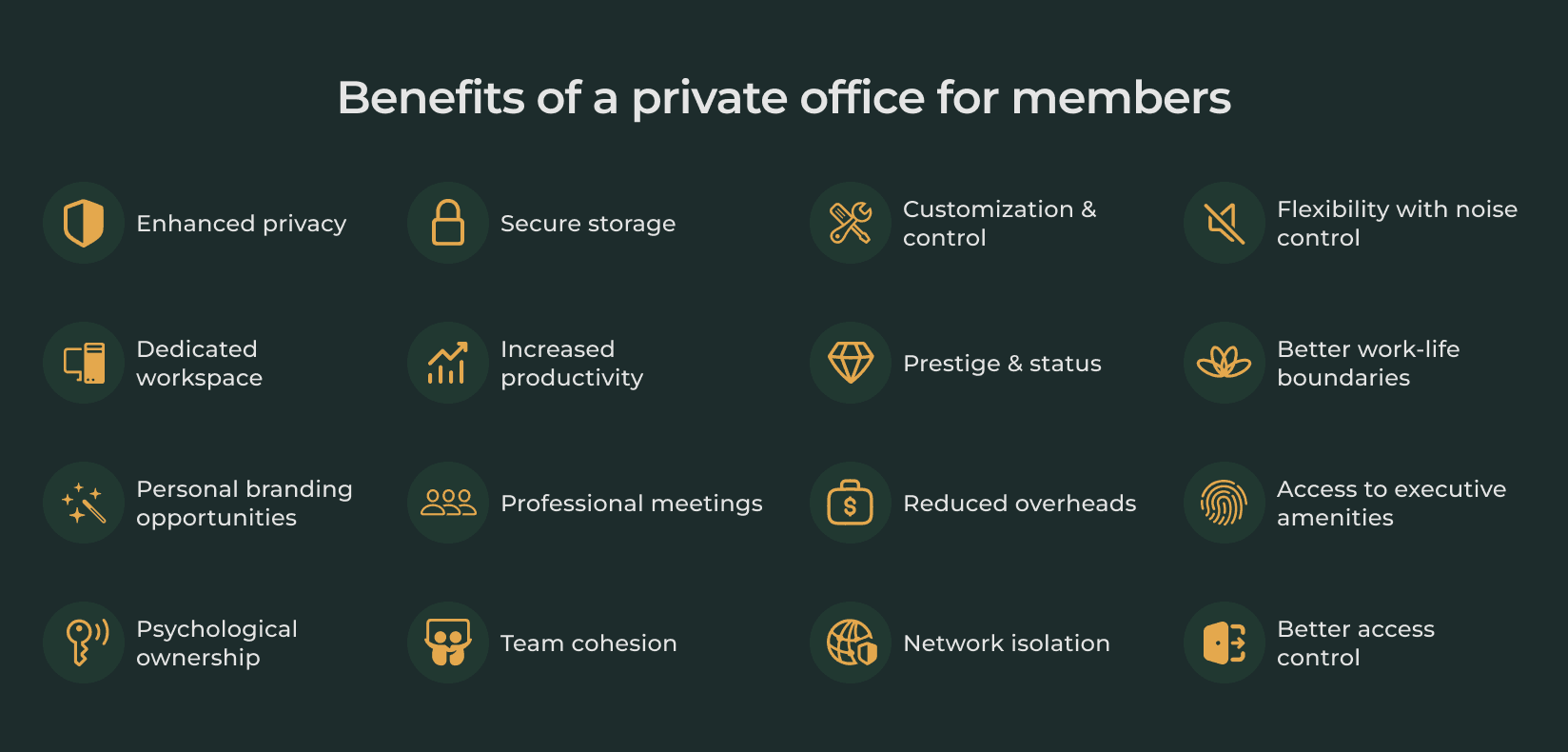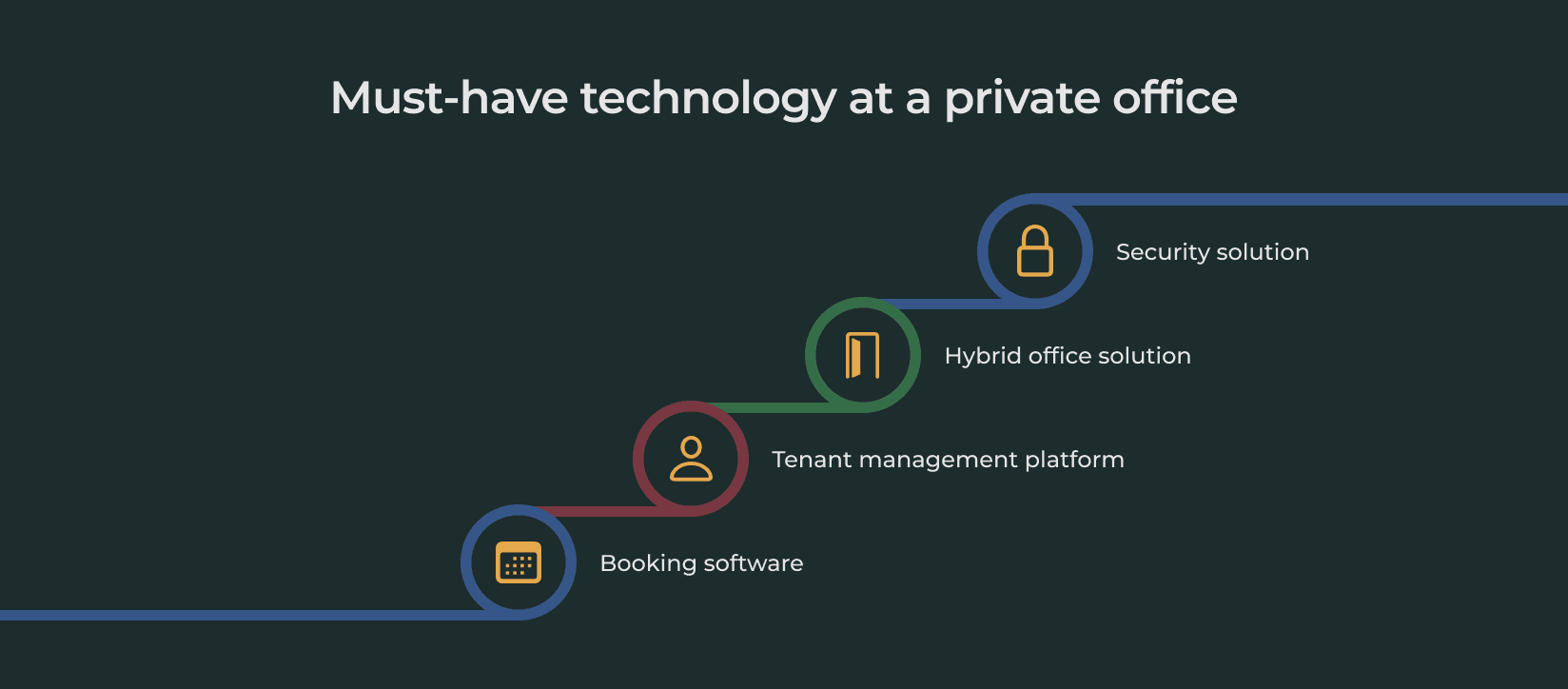- Features
- Solutions
- Pricing
- Resources
- Contact
- Book a demo

Table of Contents
- Why Private Office Coworking Spaces Exist
- Who Uses Private Office Coworking Spaces
- Business Opportunities For Private Office Coworking Model
- Benefits of Private Office Coworking Spaces For Members
- Key Amenities to Look For
- Operations and Security Challenges
- Financial Implications
- Legal and Compliance Issues
- Maintaining Community and Culture
- Quality Control and Maintenance
- Solving Challenges With Technology
- Summary
In today's evolving workspace landscape, the concept of private office coworking spaces is gaining significant traction. This guide delves into the world of private offices within coworking environments, exploring why they exist, who benefits from them, and the business opportunities and challenges associated with this model.
We'll also highlight the numerous benefits for members and provide insights into key amenities to look for. Whether you're considering launching a private office coworking space or simply curious about this growing trend, read on to discover the ins and outs of this unique coworking niche.
Why Private Office Coworking Spaces Exist
Private office coworking spaces have emerged as a response to the evolving needs of today's workforce. These spaces aim to strike a unique balance by offering privacy and exclusivity within the dynamic framework of a community-driven environment.
Deskmag reports that more than half (51%) of coworking spaces now offer private offices for teams and calls, highlighting the increasing demand for private office solutions in coworking environments.
The Business Model and Its Inherent Challenges
Business Model
The primary goal of private office coworking spaces is to create a professional setting where individuals and teams can work privately, away from the distractions of home or traditional office environments. Here, businesses and professionals can enjoy the flexibility of coworking while having their dedicated, secure office space.
Challenges
- High Operational Costs: Maintaining private office spaces demands more significant investments in terms of real estate, furnishings, and amenities. This translates to higher operational costs compared to standard coworking spaces.
- Complex Legal Agreements: Offering private offices often involves intricate legal agreements, including lease contracts and agreements for additional services. Ensuring these agreements are fair and comprehensive can be a legal challenge.
- Longer Sales Cycles: Private office spaces cater to a specific clientele, and the sales process can be longer due to the need for customized solutions and addressing unique client requirements.
- Balance Between Privacy and Community Engagement: Striking the right balance between providing privacy and fostering a sense of community can be a delicate challenge. Coworking spaces thrive on networking and collaboration, and private office clients also seek isolation.
Who Uses Private Office Coworking Spaces
Private office coworking spaces cater to a diverse range of professionals and organizations seeking a dedicated and secure workspace. Here's a quick look at the key user groups.

1. Freelancers
Freelancers often find it challenging to maintain focus and productivity in a home environment. Private offices provide a quiet, distraction-free space where they can work without interruptions.
2. Remote Workers
Many remote workers need an office-like setting to enhance their productivity. Private offices offer a structured environment conducive to effective work, making them an attractive option for remote teams.
3. Small Businesses
Small businesses may require office space but are hesitant to commit to long-term leases. Private office coworking spaces offer a flexible solution without the hassle of conventional lease agreements.
4. Corporate Teams
Large corporations often have satellite teams working in different locations. Private office spaces allow these teams to have their own dedicated workspace, ensuring continuity and maintaining a corporate presence in various regions.
Business Opportunities For Private Office Coworking Model
Private office coworking spaces offer a host of opportunities for innovative business models. Let's explore these opportunities.
1. Higher Revenue Potential
Private office coworking spaces have a unique advantage in terms of revenue potential. These spaces often command higher rent, making them a lucrative venture.
To further boost revenue, consider offering customizable private office spaces that can be tailored to the specific needs of your clients. Additionally, providing supplementary services such as dedicated phone lines, efficient mail handling, and reliable IT support can enhance the overall value of your offerings, making them more attractive to businesses and professionals seeking private workspaces.
2. Niche Market Focus
One of the strengths of private office coworking spaces lies in their ability to cater to specific niche markets. These spaces often attract remote teams, small businesses, and corporate units that require privacy and dedicated workspace.
To capitalize on this opportunity, tailor your services to meet the unique needs of these niche markets. Consider offering specialized services such as HR support, legal consultancy, and industry-specific software solutions, ensuring that your private offices cater to the specific requirements of your clientele.
3. Long-term Contracts
Stability is a prized attribute in the world of business, and private office coworking spaces can offer just that. Businesses prefer a stable and reliable workspace that meets their requirements, and they are more likely to commit for longer periods.
To capitalize on this opportunity, consider offering multi-month or annual contracts with discounted rates. This approach not only ensures a steady revenue stream but also cultivates a loyal client base that values the stability your private offices provide.
4. Premium Services
Private office clients often seek premium services that enhance their work experience. From high-speed internet and state-of-the-art meeting rooms to video conferencing facilities, there's a demand for top-tier services.
To leverage this opportunity, create packages that bundle premium services into membership options or offer them as add-ons for an additional fee. This approach adds extra value to your offerings and can significantly boost your revenue.
5. Corporate Partnerships
Private office coworking spaces are well-positioned to attract established businesses, opening up opportunities for valuable corporate partnerships. Collaborations with these businesses can bring in revenue and enhance the appeal of your space.
Consider developing corporate packages that include team-building events, workshops, and industry-specific amenities. For instance, offering media production rooms for advertising agencies can be a unique selling point that attracts corporate clients and bolsters your revenue.
6. Branding and Exclusivity
The premium and private nature of private office coworking spaces creates opportunities for strong branding and exclusivity. This allows your space to stand out from regular coworking options.
To capitalize on this opportunity, consider partnering with high-end brands for exclusive offers. Such partnerships not only increase your revenue but also contribute to the overall brand image of your private office space, making it an appealing choice for discerning clients.
Benefits of Private Office Coworking Spaces For Members
Private offices in coworking spaces offer members a host of benefits. Understanding these advantages can help you meet the unique needs of your members and create a thriving community. Let's dive into the 16 key benefits of private office coworking spaces.

1. Enhanced Privacy
Private offices provide a serene and secluded space where professionals can engage in confidential discussions, strategize, and make personal calls without the worry of disruptions or eavesdropping. This privacy is especially crucial for members handling sensitive information, such as lawyers and therapists, creating a secure and trusted workspace.
2. Dedicated Workspace
In a private office, members have the opportunity to personalize their workspace. They can arrange the office layout, select furniture, and control lighting to match their preferences, fostering a sense of ownership and comfort. This is particularly valuable for creative professionals who thrive in a customized work environment.
3. Personal Branding Opportunities
Private offices often allow for personal branding, enabling members to create a workspace that reflects their company's culture and identity. This goes beyond placing a logo; it's about leaving a lasting impression on visiting clients and partners, demonstrating a commitment to brand identity and professionalism. This feature is particularly beneficial for marketing agencies, design studios, and startups aiming to showcase their unique style.
4. Secure Storage
Security is a paramount concern in private offices. Members can leave their belongings and equipment without anxiety regarding theft or tampering, offering peace of mind. In shared coworking spaces, such concerns can affect productivity, forcing individuals to carry their valuables. Private offices alleviate these concerns, creating a secure space for belongings.
5. Increased Productivity
The solitary environment of a private office enhances productivity by eliminating the noise and distractions commonly found in shared coworking spaces. This is ideal for tasks that demand intense focus, making it particularly attractive to professionals such as developers, writers, and data analysts.
6. Professional Meetings
Private offices serve as versatile settings for professional meetings, interviews, and presentations. The professional ambiance can impress clients and partners, removing the need to book separate meeting rooms. This feature streamlines the process of hosting and organizing meetings, benefiting businesses that frequently meet with clients.
7. Team Cohesion
In the case of teams utilizing private offices, these spaces become hubs for collaboration. The proximity of team members fosters better communication and camaraderie, encouraging creativity and teamwork. This is advantageous for businesses where collaboration is vital, such as software development and marketing teams.
8. Customization and Control
Customizing private offices allows members to shape their workspace according to their preferences. They can choose the layout, ergonomic furniture, and lighting, creating a workspace that caters to their specific needs. This customization is a significant attraction for startups and creative professionals who require unique and tailored work environments.
9. Prestige and Status
Having a private office often conveys a sense of prestige and professionalism, making it a valuable asset when hosting clients, partners, or investors. The confidence gained from conducting meetings in a sophisticated, private setting can leave a lasting impression, potentially leading to increased business opportunities.
10. Reduced Overheads
One of the hidden benefits of private offices is the reduction in overhead costs. Members can enjoy all the perks of having their own office without the administrative burdens. Cleaning, maintenance, and utilities are managed by the coworking space, allowing members to focus on their work without dealing with office logistics.
11. Network Isolation
Data security is a top priority for businesses. Private offices often come equipped with dedicated internet lines and secure network options to safeguard sensitive information. This is crucial for industries where data protection and cybersecurity are paramount.
12. Flexibility with Noise Control
Whether members require a quiet atmosphere for focused work or a more dynamic environment for making frequent phone calls, private offices offer the flexibility to adjust the noise level according to their needs. This is a valuable feature for professions where controlling noise levels is essential, such as customer support or sales.
13. Better Work-Life Boundaries
Private offices facilitate a clear separation between work and personal life, benefiting remote workers and freelancers. This distinction contributes to improved mental well-being by enabling members to disconnect from work when they leave their office, reducing burnout and enhancing overall job satisfaction.
14. Access to Executive Amenities
Certain coworking spaces reserve exclusive amenities for private office members. These may include access to luxurious lounges, premium coffee machines, or concierge services. These additional perks enhance member comfort and convenience, providing a unique and attractive value proposition.
15. Psychological Ownership
The feeling of owning one's workspace is a powerful motivator, leading to increased job satisfaction and motivation. Members perceive their private office as a personal space, contributing to greater productivity and a strong sense of belonging within the coworking community.
16. Better Access Control
Private offices typically feature stringent security measures, including advanced access controls, ensuring that only authorized personnel can enter the space. This added layer of security enhances the privacy and protection of the workspace, making it an essential feature for businesses handling sensitive data and valuable assets.
Key Amenities to Look For
Creating a welcoming private coworking office space is all about making your clients feel at home and ensuring they have everything they need to work smoothly. Here are four key amenities to attract clients and keep them happy.

1. High-Speed Internet
In today's digital world, fast internet is like oxygen for work. Make sure your private coworking office has a reliable and speedy internet connection. It's crucial for smooth operations, from video calls to file sharing. A solid internet connection is a must-have.
2. Meeting Rooms
Your clients will often need a quiet and professional space for meetings. Set up meeting rooms with the right tech tools and comfy seating. These rooms can be the birthplace of great ideas and successful collaborations.
3. Kitchen/Cafeteria
Give your tenants a place to take a break and recharge. A well-stocked kitchen or cafeteria area is perfect. It's where they can grab a coffee, heat up lunch, and chat with others. A relaxed and friendly atmosphere can spark creativity and connection.
4. Premium Services
Offer extra services like virtual mail and dedicated phone lines. These add-ons can make your clients' lives easier and give your space a professional touch. A little extra can go a long way in making your tenants happy.
Operations and Security Challenges
Running a private coworking office space comes with its unique set of challenges, particularly in the areas of operational logistics and security. Let's dive into these challenges, exploring how to address them effectively without getting too tangled in complexity.
Operational Logistics
- Staffing Requirements: One of the first operational challenges you'll face is determining your staffing needs. Your team should be equipped to handle day-to-day tasks, welcome clients, and manage the workspace efficiently. It's crucial to ensure a welcoming and professional atmosphere.
- Utility Management: Managing utilities like electricity, water, and internet can be a logistical puzzle. You'll need to ensure that the private coworking office space has a reliable infrastructure to support the needs of your clients. Regular maintenance and swift issue resolution are key to keeping the lights on and the internet connected.
- Managing Common vs. Private Areas: Balancing the use of common areas with private ones can be a juggling act. Common areas are where people socialize and collaborate, while private areas provide a quiet, focused work environment. Striking the right balance between these spaces is essential to meet the diverse needs of your clients.
Security Challenges
- Implementing Advanced Security Measures: As the nature of private coworking office spaces is, well, private, security becomes a top priority. To ensure the safety and privacy of your clients, you'll need advanced security measures. This might include secure access control systems, surveillance cameras, and vigilant staff members. Implementing strict security protocols can instill confidence in your clients.
Financial Implications
Managing the financial side of a private coworking office space can be a bit like navigating a ship through changing tides. Here, we'll explore the financial implications, pricing strategies, and revenue diversification to keep your business afloat.
1. High Operational Costs
Private coworking office spaces often demand larger facilities and top-notch amenities to attract clients. This, in turn, leads to higher operational costs. You'll need to account for rent, utilities, staff salaries, maintenance, and other overhead expenses.
2. Pricing Strategies
Determining your pricing is a delicate dance. You want to charge rates that cover your operational costs and generate a profit, but you also need to remain competitive in the market. Pricing too high might drive potential clients away, while pricing too low could lead to financial troubles. Research the local market and your unique offerings to find that sweet spot.
3. Revenue Diversification
To maintain financial stability and even grow your business, consider diversifying your revenue streams. Offering additional services like virtual office services, printing, or tech support can generate extra income. Hosting events, workshops, or renting out meeting spaces for non-clients are also potential sources of revenue. Diversification can help offset operational costs and enhance profitability.
Legal and Compliance Issues
Operating a private coworking office space isn't all about comfortable chairs and high-speed internet; there are important legal and compliance issues to consider. Let's delve into these aspects.
1. Zoning Laws
Before opening your private coworking office, you must check the zoning laws in your chosen area. Some locations may restrict the use of private offices in certain zones. It's essential to ensure that your intended business aligns with local regulations, as non-compliance can lead to fines and potential closure.
2. Health and Safety Regulations
In a private coworking office, safety is paramount. You'll need to adhere to health and safety regulations that ensure the well-being of your clients and staff. These might include fire safety measures, proper ventilation, and accessible emergency exits. Be sure to conduct regular safety checks to maintain a secure environment.
3. Liability and Insurance
As a private coworking office owner, you'll face unique risks associated with the nature of your business. Traditional insurance packages may not fully cover these complexities. Tailoring your insurance coverage is crucial. This can protect you and your clients from potential liabilities, like accidents on the premises or damage to personal property.
Maintaining Community and Culture
Creating a sense of community and nurturing a vibrant culture in a private coworking office space can be both challenging and rewarding. Here, we'll explore these challenges and strategies to foster a close-knit and productive workspace.
Challenges
Private coworking office spaces are designed to offer a more secluded and focused working environment. However, this can sometimes make it a bit challenging to create a sense of community. Striking the right balance between privacy and community can be a delicate task.
Strategies
- Member Engagement through Exclusive Events: Organizing exclusive events within your private coworking office space can be a fantastic way to foster a sense of community. This might include workshops, happy hours, or themed gatherings. These events provide opportunities for your clients to interact and build connections while respecting their need for privacy.
- Newsletters and Networking Platforms: Keeping your clients connected through newsletters and dedicated online networking platforms is another smart strategy. Regular newsletters can highlight member achievements, share important updates, and provide a platform for clients to contribute ideas and feedback. Online platforms enable clients to engage, collaborate, and share experiences on their own terms.
Quality Control and Maintenance
Maintaining high standards of quality and ensuring the proper upkeep of your private coworking office space is vital for client satisfaction. Here, we'll delve into these aspects, emphasizing the importance of regular cleaning, equipment maintenance, and inventory management.
1. Regular Cleaning
Premium private coworking office spaces must maintain impeccable cleanliness. This means going beyond basic tidying up. Regular, thorough cleaning is crucial to create an environment that is both comfortable and professional. Pay attention to common areas, private offices, and all shared spaces to uphold a pristine appearance.
2. Equipment Maintenance
To provide the best services to your clients, it's essential to regularly update and maintain the high-end equipment in your private coworking office. This includes everything from top-notch computers and printers to ergonomic office furniture. Keeping equipment in tip-top condition ensures that your clients can work efficiently and effectively.
3. Inventory Management
Premium services and amenities can set your private coworking office space apart. Managing these effectively is essential to meet client expectations. Track the availability of services like virtual mail, dedicated phone lines, and meeting room bookings. Ensure that essential amenities, such as coffee machines and kitchen supplies, are always in stock. Keeping a well-organized inventory can help you avoid disruptions and maintain a seamless client experience.
Solving Challenges With Technology
In the digital age, technology plays a significant role in addressing the unique challenges faced by private coworking office spaces. Here, we'll explore how technology can be harnessed to streamline operations, enhance security, and efficiently manage members.

1. Booking and Scheduling Software
Managing meeting room bookings and resource allocation can be a complex task. Booking and scheduling software can simplify the process by allowing clients to reserve spaces and resources online. This ensures efficient utilization of meeting rooms, reducing scheduling conflicts and enhancing overall client satisfaction.
2. Automated Security Solutions
Advanced security technology is paramount in private coworking office spaces. Implementing biometric entry systems, access card readers, and 24/7 surveillance can enhance the safety and security of your space. These automated solutions not only protect your clients and their belongings but also provide peace of mind, which is essential in maintaining trust.
3. Tenant Management Platforms
Streamlining administrative tasks is crucial. Tenant management platforms can handle billing, invoicing, and communication with ease. They also help track service utilization, member feedback, and overall client satisfaction. This centralized hub simplifies business operations and ensures smooth interactions with clients.
4. Hybrid Office Solutions
Hybrid office solutions serve the dual purpose of identifying available offices for lease while optimizing office management. These systems offer a convenient seat booking system that complements your existing office setup. Employees can reserve desks as needed, with a single monthly invoice for the service. Additionally, office management software provides occupancy diagrams, offering a visual overview of workspace usage, empowering you to make well-informed decisions about space allocation within your office environment.
Discover how hundreds of spaces worldwide unlock success and grow better with Spacebring
Summary
Operating a private office coworking space comes with its unique set of challenges, but the potential for premium services, higher revenue, and a targeted customer base makes it a truly rewarding venture. By addressing operational, legal, and financial considerations and leveraging technology, you can create a secure and thriving workspace that meets the expectations of your clients.
Trends to Watch
As the coworking landscape continues to evolve, it's essential to stay tuned to emerging trends that could influence the future of private office coworking spaces.
1. Increased Demand for Privacy
In today's fast-paced business world, there's a growing demand for private and secluded workspaces. Many professionals seek a balance between collaborative environments and private offices, and private coworking spaces are well-positioned to cater to this demand.
2. Integration of Smart Office Technology
The integration of smart office technology is on the rise. These technologies not only enhance the user experience but also streamline operations and improve security. Being tech-savvy and keeping up with the latest developments can give your private coworking space a competitive edge.
3. Sustainability Concerns
Sustainability is no longer just a buzzword; it's a driving force in the business world. Clients are increasingly looking for eco-friendly workspaces. By adopting sustainable practices, you can not only attract environmentally conscious clients but also contribute to a better future.
In conclusion, private office coworking spaces offer a unique and promising business opportunity. By staying informed about industry trends and adapting to changing client needs, you can build a successful and resilient business that continues to thrive in the ever-evolving world of coworking.




